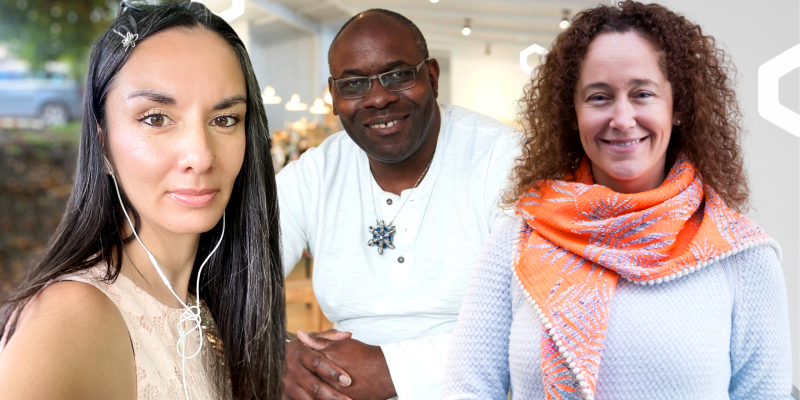Blog
Image

5 lessons learnt from #AChangingWorld
Over the last few months we have seen the effects of COVID-19 and its lockdown measures have a huge impact on how social enterprises and charities navigate using social investment. In this blog post we round up lessons from our #AChangingWorld podcast.
Blog
Image

3 social entrepreneurs who have adapted to the crisis
The UK’s 100,000 social enterprises work close to their communities and employ two million people, often supporting minoritised and marginalised groups.
But the COVID-19 crisis has had a huge impact on them. At the School for Social Entrepreneurs, we ran a survey with our programme participants to better understand the impact of pandemic. Almost two-thirds (63%) said their trading impact was wholly negatively affected.
Blog
Image
A Changing World: Lessons from The Craufurd Arms
The Craufurd Arms is a pint-sized community owned pub in Maidenhead that is tackling social isolation and becoming a hub for creating long-lasting relationships. Like many other pubs, they’ve been hugely impacted by the ongoing COVID-19 crisis.
Blog
Image

How to cope in a changing world
As the COVID-19 crisis evolves, so do social impact organisations. Some have ceased trading. Others have tailored their offering to support people through new products or moving activities online. Some are using this enforced ‘downtime’ to inwardly reflect and develop strategies.
Whatever your situation during these turbulent times, Henna Patel from School for Social Entrepreneurs has rounded up some key coping strategies to help you navigate a changing world.
Blog
Image
Your Questions Answered: When social investment isn't the answer, 10 tips for fundraising during a crisis
When social investment isn't the answer: Top 10 tips for fundraising in a crisis
Social investment is one of the tools in your toolkit – but it might not always be the right tool for the job. Alongside the Government support available, grants will also play a crucial role in supporting charities and social enterprises navigating a changing world during and after the Covid-19 crisis.
We spoke to Jo Heywood (Relationships Director, Big Society Capital) who started her working life as a social entrepreneur and has worked in a number of charities in fundraising roles. In this post, Jo shared with us her top 10 tips.
Image
Blog
Image

Your questions answered: the new Resilience & Recovery Loan Fund and other emergency finance
New lending facilities have been announced that will provide loan finance to charities, social enterprises, and small businesses - read Big Society Capital’s blog post about it here. They include the Resilience & Recovery Loan Fund, which has been established by Social Investment Business with support from Big Society Capital in response to the Covid-19 crisis.
The Resilience & Recovery Loan Fund will aim to offer loan finance to social enterprises and charities experiencing difficulties as a result of the COVID-19 crisis. The aim of this fund is to extend the government’s Coronavirus Business Interruption Loan Scheme (CBILS) to social enterprises and charities, making it easier for them to access.
Blog
Image

Meet our new Digital Marketing & Communications Officer
Say Hello to Good Finance's new Digital Marketing & Communications Officer, Festus Akinsulire.
Blog
Image

Policy and Research
In this section, we explore existing policy and research projects currently ongoing in relation to energy resilience.
Blog
Image
Your Questions Answered: The Growth Fund, Big Society Capital & Social Investors During Covid-19
In light of the Covid-19 crisis, social investors are looking at a number of options to help the sector, including exploring new funding and adjusting existing funding. You may have seen that the Growth Fund has announced significant changes to the Fund in response to the pandemic.
In this post by Melanie Mills (Social Sector Engagement Director, Big Society Capital) we explore what these changes mean and what is important for charities and social enterprises to be aware of.
Blog
Image

Getting Started with Social Investment
This page looks at how you can get started with your journey to social investment, including suggested next steps and tools and resources that can help.
Blog
Image

Guides and Resources
In this post, we explore the various guides and resources on the topic of energy resilience, available for anyone looking to understand more about how they can future-proof their organisation.
Blog
Image
The Home Nations Taking Centre Stage for #IWD2020
Ahead of International Women’s Day last weekend, we spoke to 4 female social entrepreneurs from across the UK to bring the Home Nations centre stage for the occasion.
Blog
Image

3 Social Enterprises Built Out of Love
Along with determination and hard work, it takes a whole lot of love to run a successful social enterprise. In this post, we’re excited to feature the stories of three social enterprises that were built with lots of love at their very core.
Blog
Image
5 lessons from 100k users
Ishita Ranjan is the Project Manager of Good Finance. She manages the website and content strategy, coordinates partners and stakeholders, and drives the direction of the project.
Image
In this post, she reflects on Good Finance's five key learnings from 2019.
Blog
Image
2019s Top Learnings on Social Impact Measurement
Henna Patel, Communications Coordinator at School for Social Entrepreneurs, shares learnings from experts and social entrepreneurs with first hand experience with social impact measurement.
Image
Blog
Image

Comic Relief: What's in it for us? A Report on Small Charities and Social Investment
We’ve all heard of Comic Relief, the major UK charity fighting for a world free from poverty. Through a busy calendar of events, Comic Relief has been fundraising to support organisations around the world since the 1980s. Interestingly, in recent years, Comic Relief has formed a social investment fund called ‘Red Shed’ through its own money. This new fund aims to further the impact of its work through new funding structures.
Blog
Image

How 12 organisations are positively impacting lives across the UK
From curtain makers to music producers, there’s an exciting range of individuals and organisations using creative & innovative solutions to drive social change across the UK. No doubt this is a sector continuing to grow.
Blog
Image

Investing for Impact: Get to know the social investors
What makes a social investor different? To start, social investors want to make investments that have both a social and financial return. In fact, many of the organisations making social investments are social businesses themselves.
Blog
Image

Programmes and Support
Aside from social investment, there's other streams of funding that can help you to improve your organisations energy resilience.
Blog
Image

Continuing the conversation: Why social entrepreneurs’ mental health is worth talking about
A few months ago, some 300 social entrepreneurs and social investors got together and started humming. Weird? Possibly. But here’s how it all began…
Blog
Image

How to be part of something bigger: Building a movement with Buy Social
At a time of political, environmental and economic crisis, we all need to do our bit to build a better world. With inequality on the rise and a climate emergency on our hands, social enterprises are providing us with the hope and solutions we need.
Blog
Image

13 Things You Ought to Know Before Considering Social Investment
It's estimated that over 3,000 charities and social enterprises have benefitted from social investment in the UK. While we haven't surveyed all 3,000, we've definitely heard a thing or two while chatting to 'the frontline' organisations who have already trodden this path.
Blog
Image

What To Do When Things Go Wrong
The UK has a lot to learn from the US when it comes to failure. Here, that stubbornly stiff British upper lip still prevents most of us from admitting when things have gone wrong. But over in America, failure is worn as a badge of honour.
Blog
Image

Investor Insight: 6 Tips On How To Become Investment Ready
Social enterprises are often treated the same way when it comes to investment readiness. However, each organisation is unique, and they should be treated as such.
